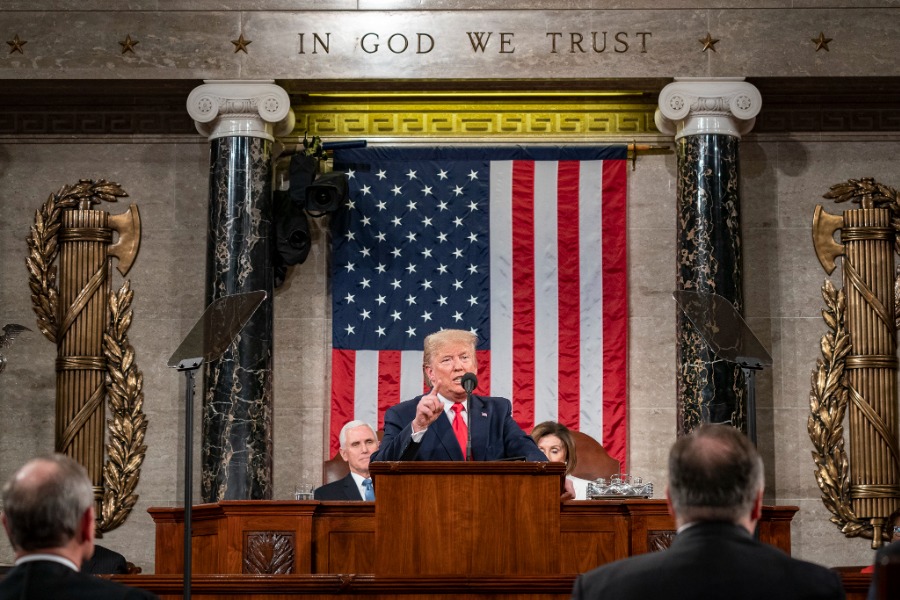The Counterproductive Legal Precedent That Strikes on Cartels Would Set

Published by The Lawfare Institute
in Cooperation With

President Trump’s decision to list six Mexican cartels as foreign terrorist organizations (FTOs) has significantly increased tensions with Mexico and may even pave the way for U.S. military action. The Mexican government has not watched these developments passively. Mexican authorities have publicly objected to the idea of a potential unilateral U.S. deployment of troops in Mexican territory. In addition to these policy objections, the Mexican government is making a legal critique of the “unwilling or unable” doctrine of self-defense. Regardless of the tensions over the Mexican cartels, Washington should carefully consider whether to reject this legal argument; if it is successful, its proliferation in a post-unipolar world will endanger U.S. security.
Mexico Is Willing and Able to Defend International Law ... Again
Earlier in January, before the Trump administration designated six Mexican cartels as FTOs, Mexico submitted a position paper to the UN Security Council outlining its legal reading of the doctrine of self-defense under the UN Charter. In it, Mexico rejected the notion that a state can use force against threats posed by state or non-state actors in the territory of another state without that state’s consent.
In particular, Mexico called out the unwilling or unable doctrine. This doctrine purports that when a state is unwilling or unable to control a threat emanating from its territory, another state can take action, even when the territorial state does not consent to use force. The United States has invoked this doctrine to justify its military activity in Syria, Pakistan, Afghanistan, and Sudan, among other states. Several countries have opposed this doctrine for years, including Mexico.
Supporters of the unwilling or unable doctrine trace its lineage to a pre-UN Charter body of law defining the rules for neutral states in armed conflict. That body of law provides that a state can attack the troops of its adversary in a neutral state if the neutral state is unwilling or unable to keep them out of its territory. Some states—especially the United States, but also the United Kingdom, Australia, Turkey, and others—apply this line of thinking one step further to justify their military actions against non-state actors, especially terrorist organizations. It is also a point of contention whether a non-state actor can commit an attack that justifies invoking the unwilling or unable doctrine.
The Mexican government’s consistent rejection of the modern application of this doctrine is grounded in principle and interest. Mexico has condemned terrorist attacks and state support of terrorist organizations, especially after the 9/11 attacks, but has also criticized the use of force against terrorist organizations. For example, like most Latin American countries, Mexico did not support the 2001 invasion of Afghanistan and criticized a 2008 Colombian attack on a FARC encampment in Ecuador as a violation of Ecuador’s territorial sovereignty.
Now that its neighbor might use force against the country, Mexico’s rejection of this rationale for the use of force is back. In the past couple of years, Mexican diplomats condemned Russia’s actions in Ukraine at the United Nations, but the former Mexican president, Andrés Manuel López Obrador, declared himself neutral in the conflict. As rhetoric from the White House becomes more hostile to Mexico, the government of the new Mexican president, Claudia Sheinbaum, is using international law again to delegitimize unilateral uses of military force outside of the traditional self-defense setting.
Mexican Principles and U.S. Interests
President Trump has invoked the unwilling or unable doctrine before, even if not directly as a justification for a use of force by the United States. During his first administration, he tweeted that Mexicans “were unable, or unwilling to stop” migrants from coming to the United States and considered designating Mexican cartels as FTOs. In 2019, Mexican President López Obrador struck a deal to avoid this designation.
Designating a group as an FTO gives the U.S. government more instruments to use against it, but it is not an automatic blank check on using force against that group. Perhaps the first Trump administration did not designate Mexican cartels as FTOs out of economic interest because the designation could harm U.S. companies. For example, gun manufacturers in the United States and U.S. importers of Mexican avocados could face legal repercussions for doing business with actors knowingly providing material support to the FTOs.
If President Trump interprets cartel activity as an armed attack on the United States, he could use a broad interpretation of the unwilling or unable doctrine to try to justify U.S. troops or bombs on Mexican soil. This would be the first time in decades that the United States overtly used military force in the hemisphere. Though the White House might invoke the doctrine and past presidential uses of force, it would have a difficult time using international law to defend it. The ramifications of these attacks would be devastating for an already fragile international order that cannot constrain the use of force.
According to the Mexican government’s position, the unwilling or unable doctrine contradicts established international law and multilateral practices. While most countries have either not established their view or have an ambiguous opinion about this doctrine, a vocal minority of countries have proposed a restrictive interpretation. Those opposed to the expansive view promoted by the United States and others argue that states that feel threatened by non-state actors should seek collective and multilateral responses following established procedures under international law. These countries do so out of an interest in ordering international politics, not just as a principled defense of the law.
These states want to prevent setting precedents that erode existing limits on the legitimate use of force. If an increasing number of states start to use this justification to take military action against non-state actors in the territory of other states, not only would the use of force in the international system increase significantly, but the system as a whole would become destabilized. Mexico is, in essence, making the case for a law-based order, with legal constraints on using military force as one of its key components.
Consequences of Invoking the Unwilling or Unable Doctrine
Invoking the unwilling or unable doctrine to attack Mexico would be counterproductive to U.S. interests. The cartels in Mexico are morphing constantly. A unilateral display of force to demonstrate U.S. strength will likely be ineffective in combating them. Bombing the cartels won’t stop or deter them.
Attacking the cartels unilaterally would also alienate the Mexican government. Mexico would stop cooperating with the United States if it bombed the cartels unilaterally. President Sheinbaum has publicly stated that the Mexican government will collaborate in fighting cartels but will not accept “subordination.” Washington would find itself fighting both the cartels and the Mexican government. A potential way to prevent the cartels from dispersing and reorganizing would be to design a coordinated strategy with Mexico to counter their finances and weapons.
Mexico has already asked the United States to target the cartels’ arms supply. Domestically, the Mexican government has proposed stricter laws to prosecute arms traffickers in Mexico. Also, the Mexican government, in response to the designation of cartels as FTOs, has doubled down on its legal campaign against U.S. companies in U.S. courts, accusing them of arming the cartels. The FTO designation could potentially force the Trump administration to pay closer attention to the activities of gun manufacturers.
Reforming and Clarifying the Use of Force Is in U.S. Interests
More significantly for international politics, if the United States invokes the unwilling or unable doctrine, it would negatively affect longer-term U.S. interests. Over the years, several states—some hostile to the United States—have used the same doctrine to justify using force against neighboring states. Both Türkiye and Iran, for instance, have used this practice to justify their illegal bombardment of non-state actors in Syria and Pakistan.
As the distribution of power shifts away from unipolarity, countries worldwide will gain strength. Some of them will have the ability and, thanks to the precedents set by the United States, the legal justification for using military force against their neighbors and beyond, with fewer and weaker legal constraints. By applying the doctrine so freely, the United States could socialize countries into accepting laxer justifications for attacking non-state actors and adversaries.
The unwilling or unable doctrine, combined with the realities of multipolarity risks, dramatically increases global instability for everyone, including the United States itself. A longer-term view of U.S. national security would recognize the benefits of the Mexican argument for the United States’s own safety and security.





